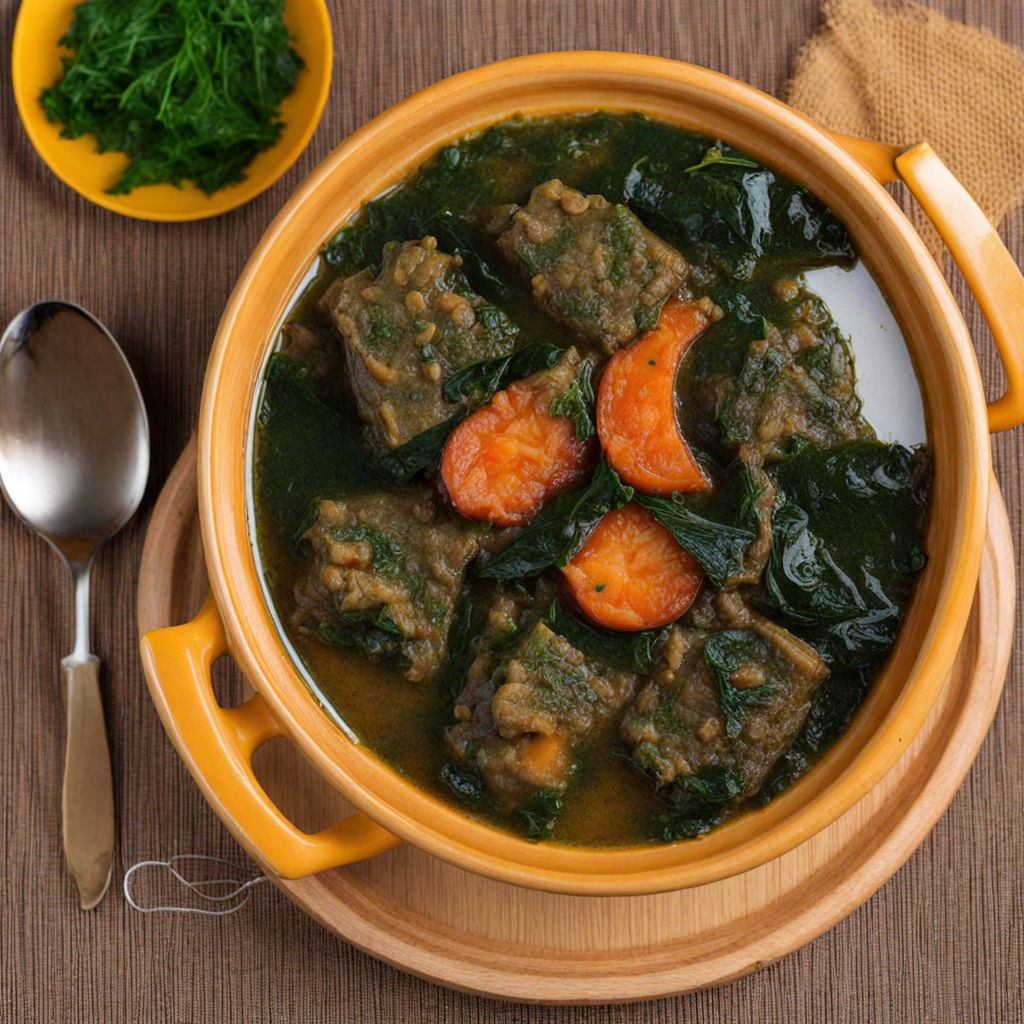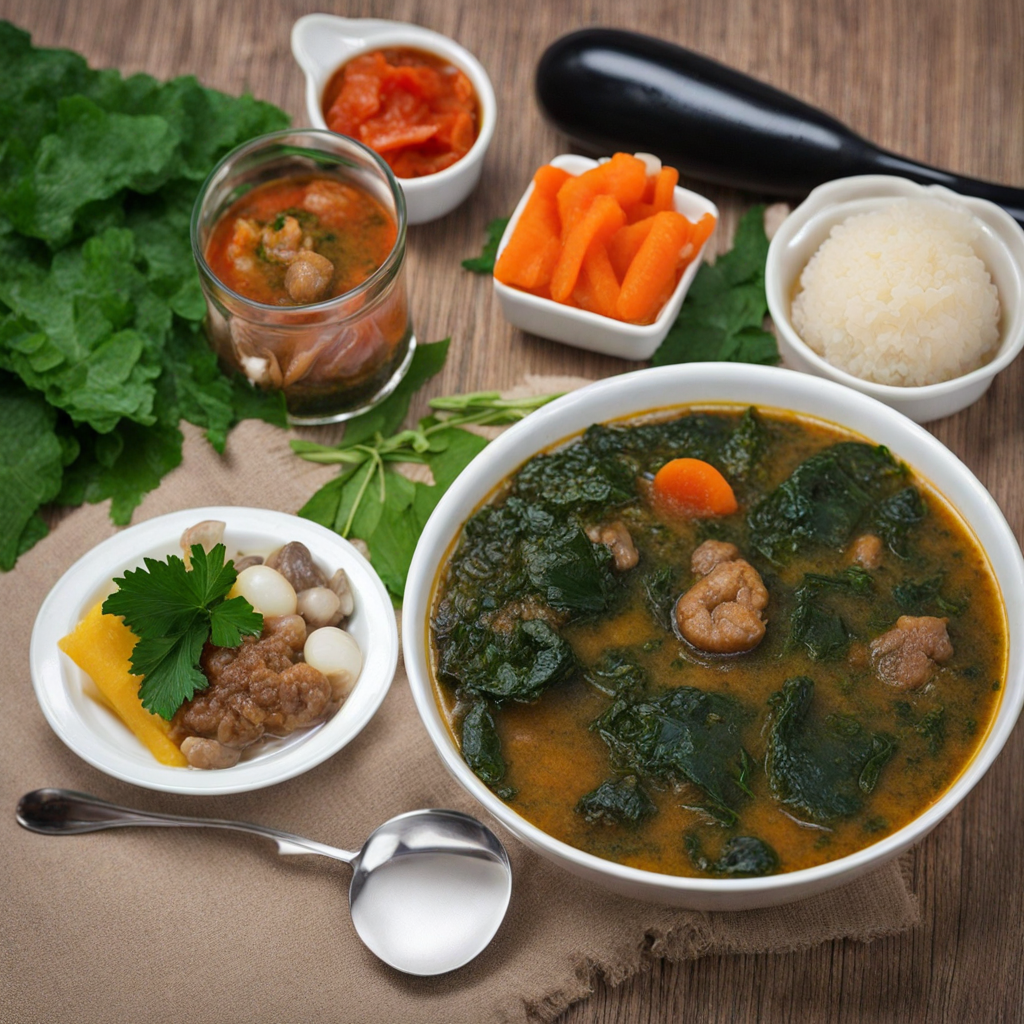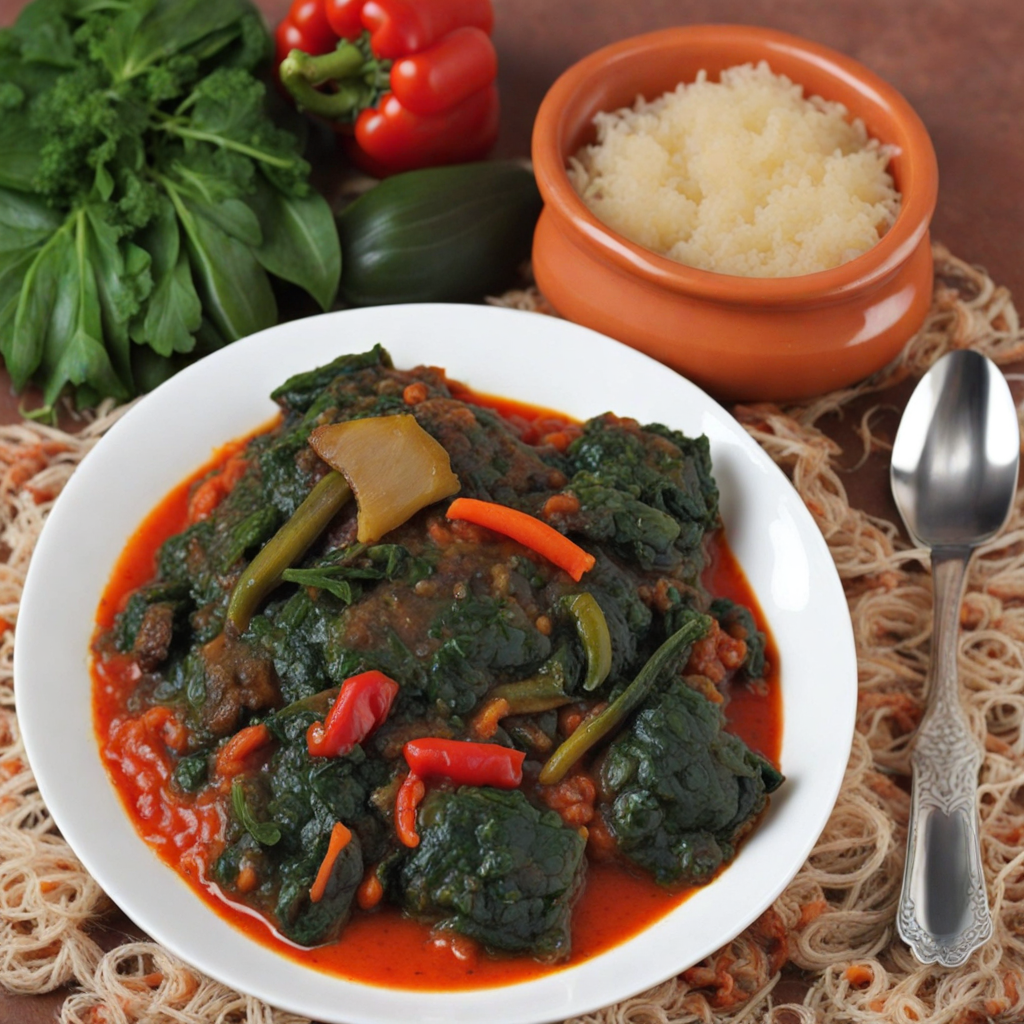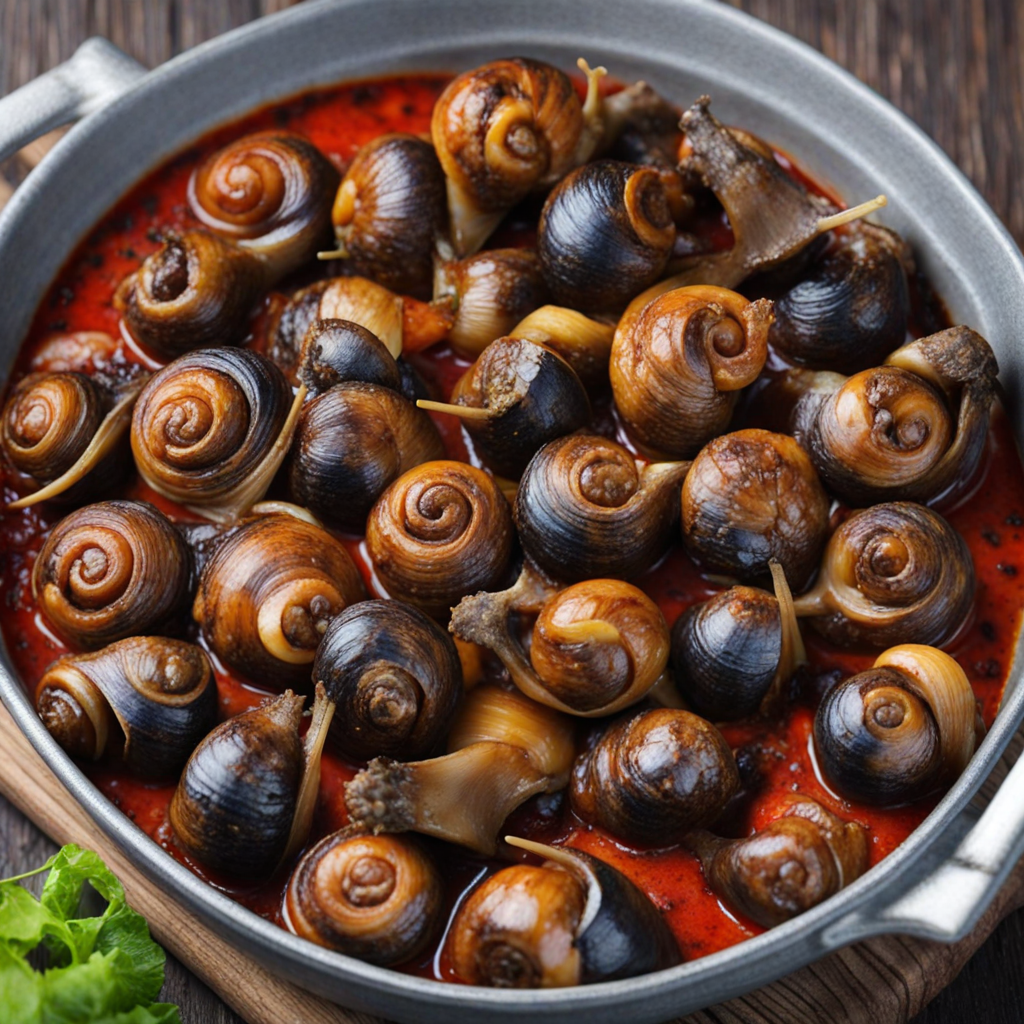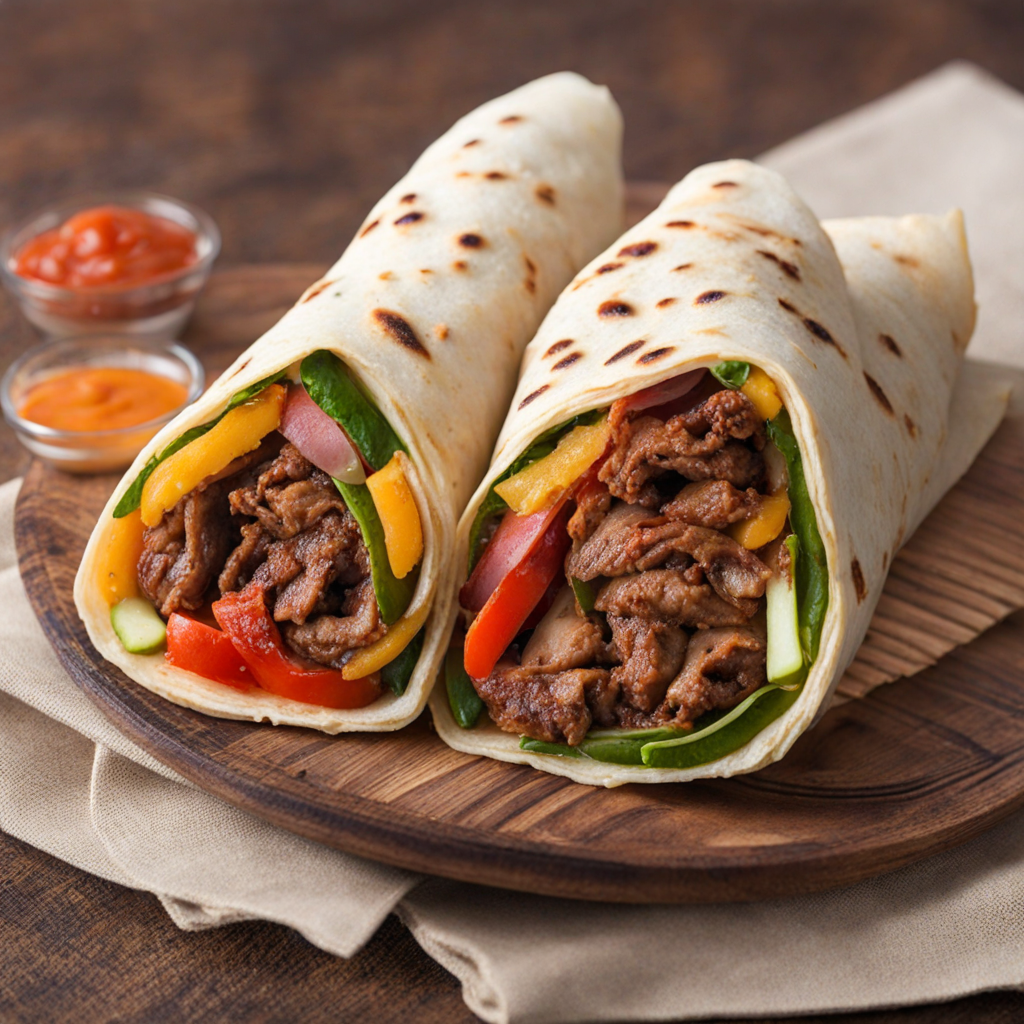Edikang Ikong Soup
Edikang Ikong Soup is a vibrant and hearty dish hailing from Nigeria, specifically the Efik people of Calabar. This rich vegetable soup is renowned for its unique combination of flavors and textures, primarily featuring a variety of leafy greens such as pumpkin leaves (ugu) and waterleaf, which are staples in Nigerian cuisine. The greens are finely chopped and cooked to perfection, creating a lush base that is both nutritious and delicious. The soup is often enriched with a medley of proteins, which may include tender meat, fish, or snails, allowing each bowl to offer a burst of flavors that reflects the rich culinary heritage of the region. What sets Edikang Ikong apart is its bold seasoning, typically enhanced with traditional ingredients like ground crayfish, pepper, and palm oil. The palm oil not only adds a deep, rich color to the soup but also imparts a distinctive taste that elevates the overall experience. The balance of the slight bitterness from the greens and the richness of the oil creates a symphony of flavors that dance on the palate. Each spoonful is a comfort, embodying the warmth of home-cooked meals shared among family and friends. This soup is often served with a side of starchy accompaniments such as pounded yam, fufu, or rice, making it a filling and satisfying meal. The combination of textures—from the tender vegetables to the succulent proteins—alongside the creamy consistency of the broth creates a delightful eating experience. For those seeking to explore new tastes, Edikang Ikong Soup offers a deep dive into the heart of Nigerian cuisine, showcasing the vibrant ingredients and culinary traditions that have been cherished for generations.
How It Became This Dish
Edikang Ikong Soup: A Culinary Journey Through Nigeria Introduction Edikang Ikong soup, a vibrant and hearty dish from Nigeria, is celebrated not just for its rich flavors but also for its deep cultural significance. A staple among the Efik and Ibibio people of southeastern Nigeria, this soup exemplifies the region's culinary heritage, showcasing local ingredients and traditional cooking methods that have been passed down through generations. Origins of Edikang Ikong The origins of Edikang Ikong can be traced back to the Efik people of Calabar, a coastal city in southeastern Nigeria, known for its rich cultural history and hospitality. The name "Edikang Ikong" is derived from two Efik words: "edikang," which means "vegetable," and "ikong," which translates to "a type of soup." Traditionally, the soup is made with fluted pumpkin leaves, known as "ugu" in Igbo and "edikang" in Efik, and is complemented by a variety of meats, fish, and sometimes snails. Fluted pumpkin leaves are prized not only for their nutritional value but also for their availability in the region. The leaves are typically harvested fresh and used in the preparation of the soup, lending a unique texture and flavor that is emblematic of the local cuisine. The use of assorted meats and fish reflects the community's agricultural practices and reliance on both land and water resources for food. Cultural Significance Edikang Ikong is much more than just a meal; it is a symbol of community and celebration. Traditionally served during special occasions such as weddings, festivals, and other communal gatherings, it embodies the spirit of togetherness and hospitality that is central to Efik culture. The preparation of Edikang Ikong often involves the collective effort of family and friends, highlighting the importance of shared experiences in culinary traditions. In many households, the soup is a way to honor guests, showcasing the host's culinary skills and generosity. The act of sharing this rich dish is a gesture of goodwill and a means of fortifying social bonds. Additionally, the soup is often accompanied by pounded yam, fufu, or rice, further enhancing the communal dining experience. Ingredients and Preparation The core ingredients of Edikang Ikong soup include fluted pumpkin leaves, assorted meats (such as goat, beef, and chicken), dried fish, stockfish, and a variety of seasonings. The richness of the soup comes from the use of palm oil, which not only adds depth to the flavor but also gives it a distinctive color. The preparation process is both an art and a science. The fluted pumpkin leaves must be carefully washed and chopped, while the assorted meats are simmered to perfection, allowing their flavors to meld. The combination of palm oil, seasonings, and the greens creates a thick, luscious soup that is both satisfying and nourishing. A crucial element of Edikang Ikong is the balance of flavors, achieved through the careful selection of seasonings such as ground crayfish, pepper, and locust beans. These ingredients not only enhance the taste but also reflect the diverse agricultural practices of the region, showcasing locally sourced produce. Evolution Over Time Over the years, Edikang Ikong has evolved, influenced by both traditional practices and modern culinary trends. While the foundational elements of the soup remain intact, variations have emerged that reflect the diverse tastes and preferences of contemporary society. The growing availability of international ingredients has introduced new flavors, and some cooks have begun to incorporate different vegetables, meats, and even seafood into the recipe, creating fusion versions that appeal to a broader audience. In urban areas, where fast-paced lifestyles often dictate eating habits, Edikang Ikong has found a place in restaurants and catering services, making it accessible to a wider audience. This commercialization of traditional dishes has sparked interest among younger generations, who are eager to explore their cultural roots while also embracing modern cooking techniques. Moreover, with the rise of social media and food blogs, Edikang Ikong has garnered international attention, promoting Nigerian cuisine on a global scale. People from diverse backgrounds are now discovering this flavorful dish, contributing to a growing appreciation for Nigerian culinary traditions. Nutritional Aspects Nutritionally, Edikang Ikong is a powerhouse. The fluted pumpkin leaves are rich in vitamins A and C, calcium, and iron, making the soup a healthy addition to any diet. The inclusion of assorted meats and fish adds protein, while the palm oil provides essential fatty acids. This blend of ingredients ensures that Edikang Ikong is not only delicious but also nourishing, aligning with the growing global focus on health-conscious eating. Conclusion In summary, Edikang Ikong soup is a culinary gem that embodies the rich cultural heritage of Nigeria, particularly within the Efik and Ibibio communities. Its origins, rooted in the local landscape, have allowed it to flourish as a beloved dish that brings people together. As it continues to evolve, Edikang Ikong remains a symbol of tradition, community, and the enduring power of food to connect us all. Whether enjoyed at a festive gathering or savored in the comfort of home, Edikang Ikong is more than just a meal; it is a celebration of life, culture, and the shared human experience. As more people discover and appreciate this delicious soup, it stands as a testament to the richness of Nigerian cuisine and the importance of preserving culinary traditions for future generations.
You may like
Discover local flavors from Nigeria


